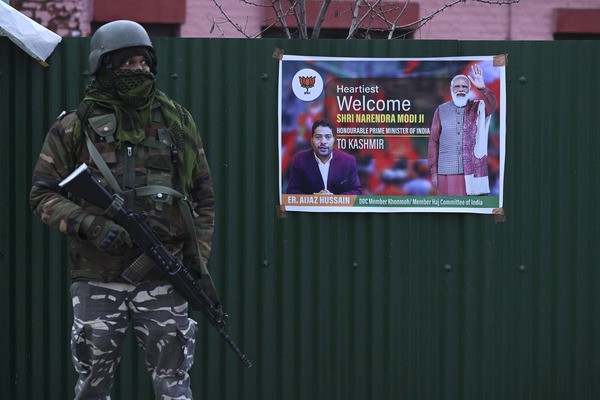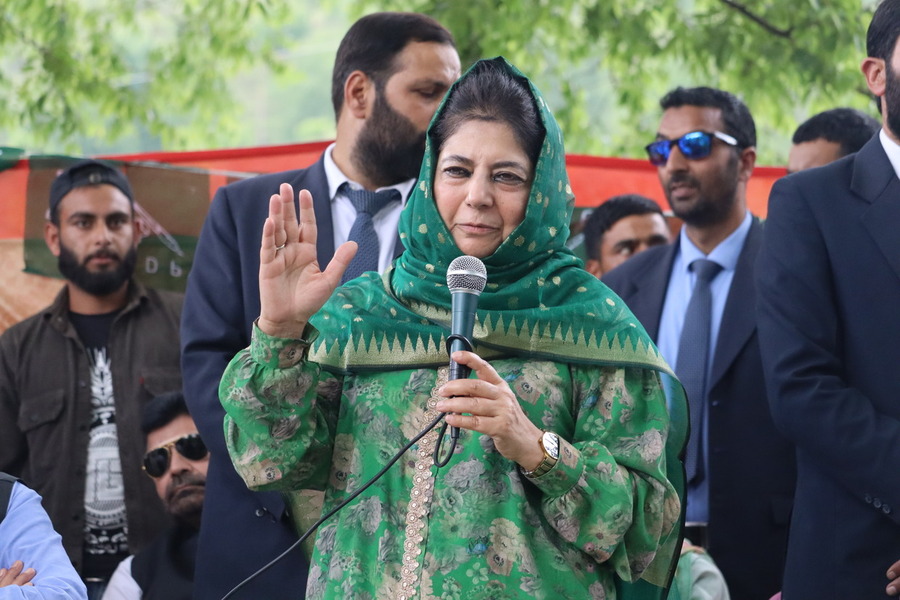The Death of Hamas Leader Yahya Sinwar: What We Know So Far
Israel and the US claim intelligence provided Sinwar’s whereabouts, but this is doubtful.
Loading...

As Prime Minister Modi champions a narrative of freedom for the violence-stricken region, an opposition figure campaigns to address grievances
By Rifat Fareed, an independent journalist based in Kashmir
After nearly five years marked by political dormancy, Jammu and Kashmir (J&K) once again resonates with the buzz of electioneering, as politicians traverse the region, from urban centers to remote villages, canvassing for votes in India's ongoing Lok Sabha (lower house of parliament) elections.
J&K, previously a state encompassing three distinct regions—the Kashmir Valley, the plains of Jammu, and the mountainous Ladakh region—has been embroiled in an armed separatist movement since 1988.
The landscape shifted on August 5, 2019, with the revocation of Article 370 of the Indian Constitution, which granted special status to the state. Ladakh was designated a separate Union Territory, as was the new J&K. Although the central government pledged local assembly elections, they have yet to materialize.
J&K comprises five parliamentary constituencies, with one in Ladakh. Of these, two Udhampur and Jammu have already held elections, leaving three in the Muslim-majority Kashmir Valley. The political contest in these seats primarily involves the J&K National Conference (NC) and the J&K People's Democratic Party (PDP), both part of the Opposition I.N.D.I.A. coalition. Former J&K Chief Minister Farooq Abdullah frames their shared adversary as the BJP.
Also vying for parliamentary seats are two other former chief ministers: Omar Abdullah (NC) in northern Kashmir's Baramulla, slated for May 20, and Mehbooba Mufti (PDP) in southern Kashmir's Anantnag-Rajouri on May 25 originally scheduled for May 7 but postponed due to logistical challenges arising from weather conditions.
Accompanied by her daughter Iltija, Mehbooba Mufti, the last chief minister of J&K, campaigns in Shopian district, once a militant stronghold. Addressing locals atop a vehicle, she passionately appeals for support, highlighting threats to their identity.
"We have been suffocated," she declares, her rhetoric charged.
On the opposing front, Altaf Thakur, a local spokesperson for the ruling Bharatiya Janata Party (BJP), credits Prime Minister Narendra Modi and Home Minister Amit Shah for restoring a sense of freedom to Kashmir, amidst allegations of suffocation.
Mehbooba's constituency now encompasses Anantnag and Rajouri, following their amalgamation by a delimitation commission. Notably, the BJP refrains from fielding a candidate in this region, emphasizing Modi's purported efforts to pacify Kashmir.

Among Mehbooba's concerns is the unresolved promise of holding assembly elections in J&K, last conducted in 2014.
Expressing skepticism about the prospect of future elections, she underscores the significance of the current polls, urging constituents to participate actively.
"You have to send a representative to parliament who will address the injustices of the past five years," she asserts. "Failure to vote now risks everything."
A recurring theme in Mehbooba's discourse revolves around the plight of families with relatives incarcerated across the country, unable to afford visits due to financial constraints.
Responding with fervor, her supporters chant, "When Mufti comes, our hardships will end."
Iltija, a recent addition to the party, echoes her mother's sentiments, portraying Mehbooba as a beacon of hope for Kashmiris.
In contrast, Modi's recent visit to Kashmir on March 7, accompanied by promises of development projects worth over $700 million, sidesteps the issue of holding assembly elections.
In his appeal to voters, Modi calls for rejecting the Congress and its regional allies, branding them 'dynastic parties.'
The BJP's electoral strategy in Kashmir historically faces hurdles in garnering local support. Not contesting in the three Kashmir seats, the BJP focuses its efforts on the two Jammu seats, where it enjoys a stronger foothold.
The NC accuses smaller parties of clandestinely aligning with the BJP, prompting the Election Commission of India to postpone voting in Anantnag-Rajouri due to adverse weather conditions, a move contested by Mehbooba.
In Srinagar, slated for voting on May 16, residents express dissatisfaction with the status quo.
"Everyone is disheartened," remarks Shahid Ahmad, a shopkeeper, highlighting the absence of political representation.
Formerly marked by low voter turnout due to separatist calls for boycotts, Srinagar now grapples with common grievances stemming from decisions made in New Delhi.
As the electoral landscape evolves, local political analyst Zaffar Choudhary anticipates mixed results, cautioning against viewing this election as a definitive verdict on the 2019 constitutional changes.
"The political terrain is deeply divided, and a one-sided outcome is improbable," Choudhary asserts.
Editor
Israel and the US claim intelligence provided Sinwar’s whereabouts, but this is doubtful.
Tata, who passed away on Wednesday, was known for his humility and his expansive vision.
Israel says the major attacks that levelled multiple residential buildings in southern Beirut targeted Hezbollah’s ‘central command’.
